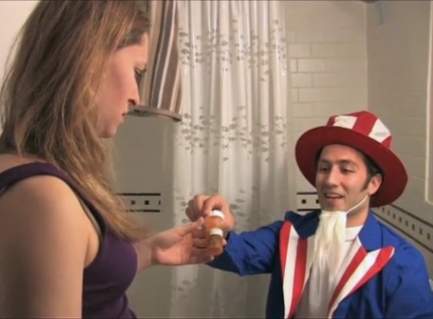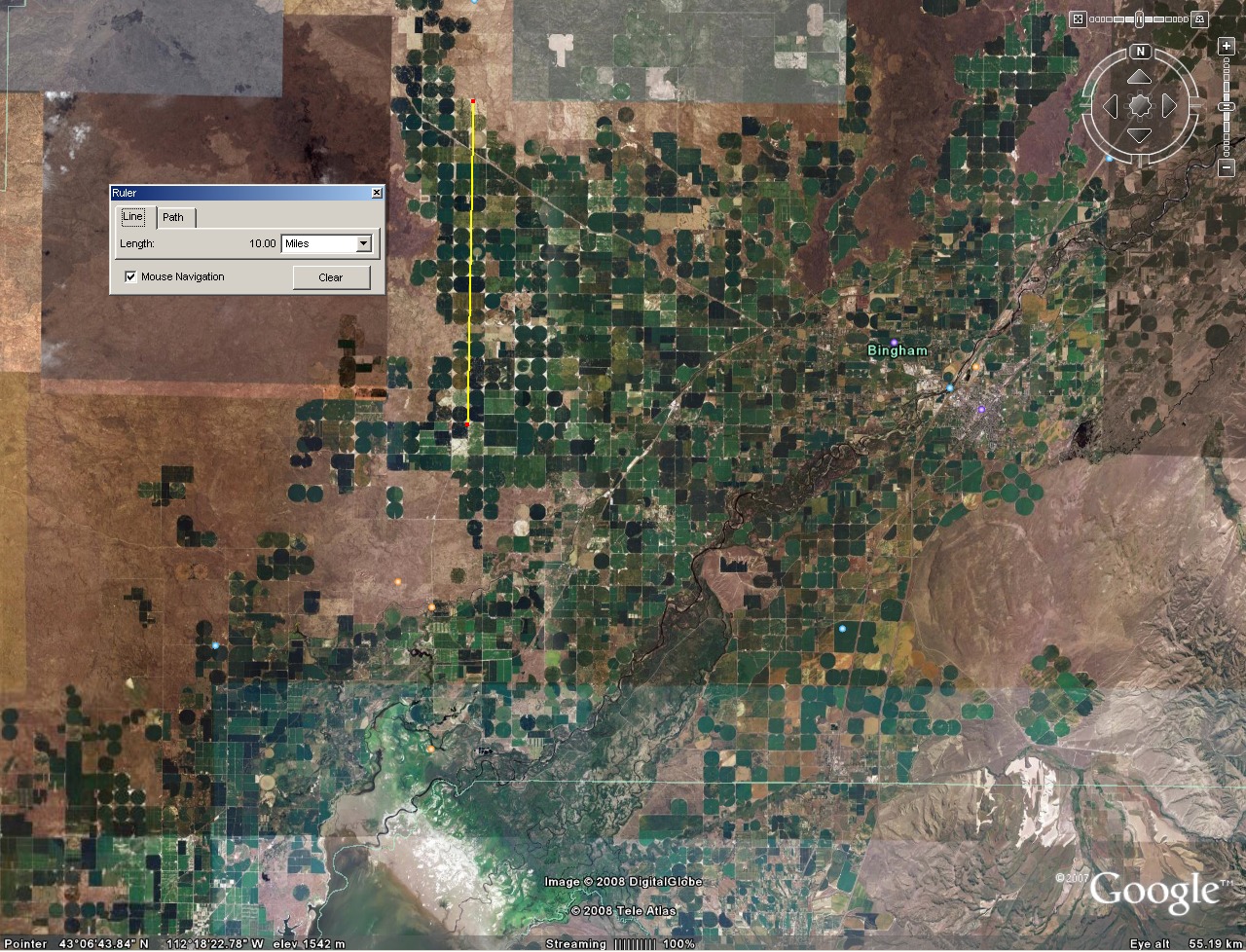Blogs
Medieval evil genius
Tue, 15/09/2009 - 08:39 — danJohn the miller grinds small small,
The king of heaven sees all, all.
In the fourteenth century, the village of Codicote, in Hertfordshire, was owned by St.Alban's Abbey. Michael Wood, in a 2008 BBC4 programme, traces the story of one woman, Christina, through the obsessive record-keeping carried out by the abbot's secretaries.
Boiling stones, feeding cars
Tue, 08/09/2009 - 11:22 — danStuffed and Starved has an article, written for the The Nation, that compares Bill Gates' Alliance for a Green Revolution in Africa (AGRA, better funded than many government programs) with the earlier post-second-world-war one. (Which was also a magnate-sponsored affair.) In a previous post I said:
The stark facts are difficult to surmount: the Green Revolution turned Mexico from a wheat-importing to an exporting country in 20 years.
Raj Patel's post makes clear why this doesn't say anything useful about whether that helped Mexicans to eat.
A toast to Karl Otrok
Sun, 05/07/2009 - 21:18 — danI've watched three films about food recently; I'll write about them together at some point, continuing the '3' theme. Right now, I want to raise a glass to one man with a walk-on part in the Austrian film We Feed the World, currently available via Google video and we join Karl Otrok in his four-wheel drive at about 39 minutes.
Karl Otrok is - or, I suspect, was - director of Pioneer's Romania operations. Pioneer is a US-owned seed company, second only to Monsanto. They're owned by DuPont. Karl begins his tale in what appears to be full High Modern mode: contrasting the four-wheel-drive lifestyle of a Pioneer director to the horse-drawn power of much Romanian farming. But while he begins as ambassador for Pioneer - and clings to his company loyalty throughout - we witness a rapid landslide of his veneer of self-belief.
Three adaptive landscapes
Fri, 26/06/2009 - 16:08 — danThree communities I've come across in the last few years have made me see language and order in a new way. Two I've read about - Peruvian potato farmers and Balinese rice-growers. The other - Mutawintji - I visited as a tourist on an Outback safari before the PhD started. I'll get all my caveats out of the way: no in-depth knowledge of any of these; it'll seem like a pretty functionalist argument; I know almost nothing about anthropology. Given that…
The social technology of drug production: can we do better?
Fri, 19/06/2009 - 10:44 — dan
Last night, BBC2 aired The Price of Life, a documentary examining the NHS’s purchase of a new cancer drug. Myeloma is a cancer of the plasma cells. A US company, the Celgene Corporation, holds the patent on lenalidomide (Revlimid in the US.) People survive for an average of just over a year longer than they might have done without it.
In the programme, Adam Wishart follows a number of patients awaiting a decision from NICE, and several other players in the health market: the chair of the NICE committee making the decision, an NHS fund manager, and the head of Celgene.
We’re present at a NICE committee meeting where it’s decided the NHS can’t afford lenalidomide. There’s a specific money limit per year for treatment at certain points in life, based on Qalis - a combination of economic and social value. This leads to a specific cost limit, and this drug is too much. By the end of the programme, this situation has been reversed – back to that in a moment.
Merging at the edges
Sat, 13/06/2009 - 20:06 — danA (hopefully measured) rant about sociobiology / pyschology / behavioural modelling, in response to an email on the SIMSOC list, rehashing themes covered on this blog:
The under-served poor
Tue, 28/04/2009 - 11:48 — danJust found this essay from 2006/7 - it's a nice insight into the weird contortions that occur when government encourages large corporations to have a go at policy, and will do as a blog entry while I try and remember how to write. My personal favourite is the "clone town britain by design" plan - see below. If I was writing it today, I'd probably put more emphasis on who wrote the most stunningly obtuse lines - since it's easy to read this stuff as the Voice of Capitalism rather than someone in a quango with an Open All Hours mentality. (One line I haven't used here, from the same report: among the benefits of luring Tesco into your regeneration area include offering unemployed locals 'the dignity that comes with work'. Clearly, the writer had never worked in a supermarket. I lasted two weeks.) But it's right to wonder - why on Earth would governments get so swoony over Tesco et al that they let them do this stuff?
---
In New York, only a day after the towers fell, Mayor Rudolph Giuliani counselled his trembling constituents to 'show you're not afraid. Go to restaurants. Go shopping.' When the world's people asked how they could help, he said, 'Come here and spend money.' Shopping became a patriotic duty. Buy that flat screen TV, our leaders commanded, or the terrorists have won." [Levine 2005[1]]
Tackling social exclusion is the new main task for retail planning policy-to provide access to shopping for all." [Nick Raynsford, Planning Minister 1999 to 2001, speech to British Council, quoted in Wrigley et al 2002 p.2110]
Introduction
Business in the Community (hereafter BitC) is a Department of Trade and Industry funded QUANGO, with charitable status. According to its website, it "inspires, engages, supports and challenges companies to continually improve the impact they have on society."[2] In 2002 and 2005, they produced research to support a project called 'business investment in underserved markets.' This essay presents some of the key assumptions of this research. The aim here is not to examine the empirical accuracy of the research's claims - that topic is far too big to shoe-horn in here. Instead, I want to illustrate just how far UK governance has moved towards embracing a consumerist view of social progress. The research has very idiosyncratic blindspots and emphases that provide a sometimes startling insight into what happens when government policy and corporate thinking come together. Four 'transformational' pilot projects have been identified, based on the recommendations of this BitC work. Again, I haven't covered the results here; but it is worth noting that BitC do have the government backing needed to attempt their version of regeneration, at least on a small scale.
A farm for the future
Mon, 23/02/2009 - 15:24 — dan
BBC2 aired 'A Farm for the Future' this week. (That was the iplayer link; here's a hopefully permanent download link.) Rebecca Hosking was born on a Devonshire farm and, on returning to it again, she has decided to try and find out how it might be run if the oil starts running out. (She's also done a fine write-up in the Daily Mail - a sentence I'm unlikely to say again in the near future.)
There are many great, graphic images in this, alongside the story of just how reliant on fossil fuels our farming is. A few quick thoughts: she tells us there are 150,000 farmers left - average age 60. "British farming has effectively been left to die." Well - that's what happens in a world of comparative advantage. Other countries can make the food, and we can sell financial servi... oh.
Chickpea Earth
Mon, 19/01/2009 - 12:17 — danNote: this is a long, rambling entry that swings from naval gazing to some interesting stuff on global energy futures.
Houmous
There's a gymball in my bedroom: silver, 800mm wide. Having stared at it for a while, I started to wonder - if the sun were that gymball, how big would the Earth be? A few sums later I got 7mm. Some frantic measuring of dried pulses followed, and a chickpea emerged as the perfect - if slightly lumpy - candidate for sitting on the floor next to the gymball. There it sits still, so every night I can stare at it and mutter to myself, 'that's just stupid.' I include a photo of chickpea on gymball. But photos, this description - they don't do it justice. Find a gymball of equal size, get a chickpea: hold it between thumb and forefinger, having made sure to watch a video of the sun first. (Some would argue 'blue marble' better captures the wonder of it; each to their own.)

Incidentally, you can scale to anything you like at this website. At the scale above, chickpea would be 85 metres away from gymball.
I've also been trying to wrap my noggin around our place on Chickpea Earth. This has included an alarming assault on my sense of Earthly security, such as a list of all the ways in which we might never have existed. Some of these were covered in rather sensationalist tone by Tony Robinson's channel 4 series, 'Catastrophe Earth'. This quote sums up the general approach:
85000 years ago, humans were just heading out of Africa; the meteoric rise of our species makes us feel indestructible. Yet we are more vulnerable than we might care to imagine. We live on a thin crust that floats on a sea of pressurised molten rock and we rely on the proximity of a star to keep temperatures optimal for life. Meanwhile our planet moves through space, which is populated by numerous flying objects.
Nitrogen, war, food
Tue, 11/11/2008 - 15:01 — dan
In 1918 the Nobel Prize for Chemistry was given to Fritz Haber: he invented a method for synthesizing ammonia - that is, nitrogen 'fixed' with hydrogen - a chemical vital for organic life. The process was used during the First World War to make munitions: the allies got theirs from South American mines. Without industrial-scale production of ammonia, the war would have been considerably shorter. Verdun, for example - where a service took place today on WWI's 90th annivesary - was bombarded with a hundred thousand shells an hour - an hour! - at the start of the battle. (As well as a hundred thousand gas shells a day: Haber was instrumental in the development of gas warfare. Randomly, I now realise he was the subject of a brilliant Radio 4 play I caught the second half of. His scientist wife committed suicide. If the play is to be believed, this was to shock him into realising the monster he'd become. I buy that: radio 4 fiction will do for me as a factual source.)

Recent comments
21 weeks 6 days ago
2 years 12 weeks ago
2 years 12 weeks ago
2 years 14 weeks ago
2 years 15 weeks ago
2 years 15 weeks ago
3 years 12 weeks ago
3 years 36 weeks ago
3 years 36 weeks ago
3 years 38 weeks ago